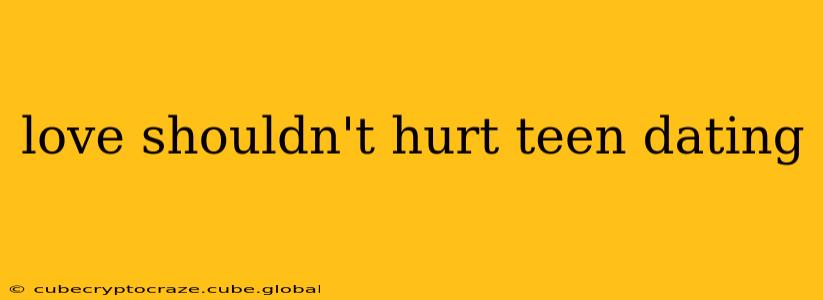Teenage years are a time of exploration, self-discovery, and, for many, the exciting (and sometimes confusing) world of dating. While the thrill of a first crush or budding romance can be exhilarating, it's crucial to remember that healthy relationships are built on respect, trust, and mutual happiness. Love should never hurt, and this guide will help teens navigate the complexities of dating and identify unhealthy relationship dynamics.
What is a Healthy Relationship?
A healthy relationship is characterized by mutual respect, open communication, and a balance of power. Both partners feel comfortable expressing their feelings and needs without fear of judgment or retaliation. There's a sense of equality, where neither person controls or manipulates the other. Trust is paramount, and both individuals feel safe and secure in the relationship. Disagreements are handled constructively, with a focus on compromise and understanding. Most importantly, both partners feel happy, supported, and empowered.
What are the Signs of an Unhealthy Relationship?
Unfortunately, not all relationships are healthy. Recognizing the warning signs is crucial for protecting your well-being. Unhealthy relationships often involve:
- Controlling behavior: This could include monitoring your phone, social media, or whereabouts; dictating who you can see or talk to; or limiting your independence.
- Emotional abuse: This involves using words or actions to make you feel bad about yourself, belittle your accomplishments, or make you question your worth. This might include insults, constant criticism, or threats.
- Physical abuse: Any form of physical violence, including hitting, slapping, pushing, or any other form of physical harm, is unacceptable and should never be tolerated.
- Isolation: Your partner may try to isolate you from friends and family, making you more dependent on them.
- Jealousy and possessiveness: Excessive jealousy and possessiveness are signs of an unhealthy relationship, indicating a lack of trust and respect.
- Pressure to do things you're not comfortable with: This could include sexual activity, drug use, or anything that violates your personal boundaries.
How Can I Tell If My Relationship is Unhealthy?
It can be difficult to recognize unhealthy patterns, especially when you're young and experiencing your first relationships. Ask yourself these questions:
- Do I feel pressured to change who I am? A healthy relationship should celebrate your individuality.
- Do I feel scared or anxious around my partner? A relationship should make you feel safe and secure, not fearful.
- Do I feel like I can't be myself around my partner? Authenticity is key to a healthy relationship.
- Do I constantly worry about making my partner happy? A healthy relationship involves mutual care and support, not one-sided effort.
- Do I feel controlled or manipulated? Healthy relationships are built on mutual respect and trust.
What Should I Do If I'm in an Unhealthy Relationship?
Leaving an unhealthy relationship can be challenging, but it's essential for your well-being. Here are some steps you can take:
- Talk to someone you trust: Confide in a friend, family member, teacher, counselor, or other trusted adult. Talking about your situation can help you process your emotions and develop a plan.
- Seek professional help: A therapist or counselor can provide support and guidance as you navigate this difficult time.
- Create a safety plan: Develop a plan for how you will leave the relationship safely and securely. This may involve seeking help from a trusted adult or organization.
- Remember you're not alone: Many people experience unhealthy relationships, and there is help available.
What if My Friend is in an Unhealthy Relationship?
If you're worried about a friend, offer your support and encourage them to seek help. Let them know you're there for them and that they don't have to go through this alone. You can help by listening to them, offering encouragement, and helping them find resources. Remember, you can't force them to leave the relationship, but you can be a source of support and strength.
Where Can I Get Help?
There are many resources available to help teens navigate unhealthy relationships. You can contact a trusted adult, school counselor, or a helpline dedicated to supporting young people. Online resources can also provide valuable information and support. Remember, seeking help is a sign of strength, not weakness. Your safety and well-being are paramount.
Love should be a source of joy, support, and growth. If your relationship isn't making you feel this way, it's time to seek help and prioritize your well-being. You deserve a healthy and happy relationship.
